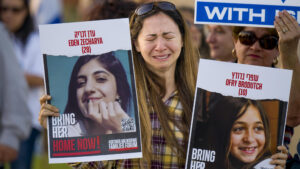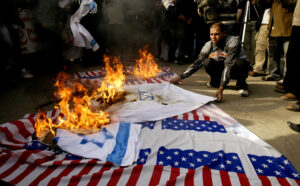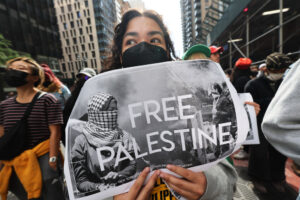We live in an apocalyptic moment, when something truly hideous, long hidden just beneath the surface of everyday life, is breaking forth from the ground. The torture, rape, massacre, and kidnapping of roughly 1,200 Israelis on October 7 was only the beginning of this revelation. In the West, Hamas’s butchery has unleashed eruptions of antisemitism and massive, increasingly violent displays of support for the terrorists. Like some mythical monster that periodically emerges from hibernation to slaughter far and wide, the rough beast, it seems, is just stretching its legs. And we are only beginning to take its measure.
It’s important to understand the sheer evil that now threatens us. Hamas has been called “barbaric”, but that is hardly a sufficient description of its primitive savagery. The Greeks called non-Greeks barbaroi because their words sounded like babble to their ears: “bar bar bar.” Barbarians ranged from the slavish inhabitants of large, sophisticated, highly stratified societies (Persians, Egyptians) to fiercely spirited, independent tribes (the forest-dwelling Northerners that the Romans called Germani). None of these peoples based their identity on the struggle against a hated Other whose total elimination, to be achieved at any cost, was their sole reason for existence. None embraced the complete destruction of body and spirit — including their own as well — that the Nazis called Vernichtung: “negation”. None, in other words, were pure enemies of civilisation.
But jihadis are. Civilisation is the sum of cultural and social conditions that make for flourishing lives and communities. Jihadism is a death cult. In a recent podcast, Sam Harris reminds us of the Taliban jihadists who, in 2014, murdered 132 Muslim children at a school in Peshawar and burned a teacher alive in front of her students. A supporter of the Pakistani Taliban said of the dead children: “We did not end their lives. We gave them new ones in Paradise…. They will be rewarded for their martyrdom. After all, we also martyr ourselves with them.”
These words are themselves apocalyptic. From the perspective of Islamic fundamentalism, there is no human being who does not deserve to die. Muslims will go to Paradise; non-Muslims will burn in Hell. Death is a blessing for true believers, divine justice for apostates and infidels. Choosing a martyr’s moral and physical self-destruction thus legitimises the deaths of everyone one can possibly kill. Murder-suicide on this grand scale is the ultimate form of religious totalitarianism, the complete control of the lives of others.
This mentality explains a lot, including the abject misery of the Gazans — a people who, pressed beneath the heavy machinery of organised death-worship, are twisted with moral scoliosis. Is it any wonder that Hamas has stolen tens of millions of dollars in humanitarian aid for military purposes? Or that it hides weapons and hostages in hospitals using sick and injured Gazans and new-born babies as human shields? Or that it blocked evacuation routes and confiscated the car keys of civilians who wanted to cross the Wadi Gaza, as the IDF urged them to do, in order to flee Israeli military action in the northern part of the territory?
Hamas’s strategy is to maximise civilian deaths in order to stimulate worldwide opprobrium of Israel, and, if possible, open up more military fronts of Iranian proxies in Lebanon and Syria. As Harris says, Hamas is “eager to martyr all Palestinians for the pleasure of killing Jews”.
But if Hamas, Isis, and other jihadis are not barbarians, what are they? This question takes us back to remotest antiquity, when very ancient peoples struggled to master the dark depths of the human psyche, and to establish the handful of “Thou shalt nots” on which all civilisation is based.
Weirdly, the most primitive tribal impulses are today expressed by means of the latest digital technology. There is a recording of a phone call that a Hamas terrorist made to his parents on October 7. The audio captures a human drama as old as recorded history: a son seeks approval from his parents for his prowess in battle. But there is something deeply twisted about their conversation. “Hi Dad!” the son shouts. “I’m talking to you from [kibbutz] Mefalsim. Open my WhatsApp now, and you’ll see all those killed. Look how many I killed with my own hands! Your son killed Jews! … Dad, I’m talking to you from a Jewish woman’s phone. I killed her, and I killed her husband. I killed ten with my own hands! Dad, ten with my own hands!” The whole time, his father is repeating “Allah hu Akbar!” A little later, the young man says “Mom, your son is a hero!”
In Homer’s Iliad, the Trojan Hector imagines the day his son, still a toddler, “comes home from battle bearing the bloody gear / of the mortal enemy he has killed in war— / a joy to his mother’s heart”. But the battle he envisions is armed combat against trained warriors, not a surprise terror attack on innocent families. The Hamas murderer claims the status of a hero, but his deeds belie his words. His perspective has no Greek analogue. It is pre-Homeric.
It is also pre-Abrahamic. In Genesis 22, God tells Abraham to take his son Isaac, the child of Sarah, up Mount Moriah to be sacrificed. Isaac embodies the entirety of Abraham’s hopes, as it is with Isaac’s descendants that God has established his eternal covenant. Abraham dutifully binds Isaac and draws his knife so that he may cut his throat, drain his blood, and burn his corpse. An angel stays his hand at the last moment, and he learns that the Almighty does not want human sacrifice.
Herein lies the basic problem: Islamists never got the message. That’s why they regard murder-suicide as a sacrament. When the Hamas jihadi’s brother tells him to come back, he replies “What do you mean come back? There’s no going back. It is either death or victory! My mother gave birth to me for the religion.” In other words, she gave birth to him so that he might advance the cause of indiscriminate death.
Why does Islam remain fertile ground for such insanity? The Bible suggests that fraternal conflict is at the root of the problem. When Abraham’s wife Sarah could not conceive, she instructed him to impregnate their Egyptian slave girl, Hagar. But when Hagar became pregnant with Ishmael, Sarah harassed her and she fled. An angel told her that her child “will be a wild ass of a man— / his hand against all, the hand of all against him”. Hagar then returned to Abraham and Sarah, but after Isaac was born, Sarah drove her and Ishmael out of their camp.
The angel’s prophecy makes sense in hindsight. An outcast twice over, Ishmael must bear considerable ill-will toward Isaac — the son favoured not only by his father and stepmother, but by God. This is important, because Muslims regard Ishmael to be the ancestor of Arab tribes, and of Muhammad in particular. Islamic tradition furthermore holds that the Jews falsified the Hebrew Scriptures, and many Muslims believe it was Ishmael, not Isaac, who was Abraham’s favoured son. These facts, too, suggest fraternal resentment.
The story of fraternal enmity and rancour is one of the earliest in the Bible, and a recurring theme in Genesis (think of Esau and Jacob, or Joseph and his brothers). It first appears immediately after the exile from Eden. Cain is incensed that God favours Abel’s sacrificial offering. Turning a deaf ear to God, who urges him not to sin, he murders his younger brother. Exiled by God, he becomes “a restless wanderer on the earth” who is nevertheless protected by the Lord’s own mark. That means he and his descendants will be with us forever. If we are to come to grips with the revenant monster that announced itself, yet again, on October 7, we must acknowledge this fundamental fact.
No one has thought more deeply about what Cain’s story means than the anonymous author of Beowulf, an epic poem that explores the open wound of the outcast brother. Heorot, the great mead-hall built by Hrothgar, king of the Shielding Danes, is a place of light, warmth and decorous ritual: generous mead-pouring and gift-giving. A microcosm of civilised existence, Heorot “stands at the horizon, on its high ground”, a Nordic city on the hill “meant to be a wonder of the world forever”. But the monster Grendel prowls the low, cold bogs outside until, berserk with anger, he splinters Heorot’s doors and wreaks bloody horror.
What ails Grendel? A “corpse-maker mongering death” in his repeated night-raids, he descends from “Cain’s clan”. For this wild branch of the sons of Adam, split off from the main human trunk by primal sin, the house of civilisation is an unbearable reproach. In Beowulf, resentment and envy are fevers of the mind that inflame and disfigure the body, twisting it into a sullen slouch. Outlawed by God, cast out by men, barred from hall and feast to gorge on envy and resentment, Cain’s clan — “ogres and elves and evil phantoms / and the giants too who strove with God”— are grotesque figurations of poisonous passions, the fermentation of the bitter fruit of exile.
Beowulf soberly acknowledges the disconcerting fact that we who dwell in the house of civilisation can neither make peace with, nor be rid of, the descendants of Cain. The eponymous hero slays Grendel and his mother and rules his people, the Geats, for 50 good years. But Beowulf finally succumbs to the poisonous bite of a flame-belching dragon, accidentally awakened after many centuries, that emerges from its subterranean lair to waste Geatish farms, homesteads, forts, and earthworks with great sprays of “molten venom”. The hero’s death spells doom for the Geats. At the poem’s end, a grieving woman unleashes “a wild litany / of nightmare and lament: her nation invaded, / enemies on the rampage, bodies in piles, / slavery and abasement”. Order and decency, peace and security, are only as solid as the ground they stand on.
The woman’s nightmare is a dark prophecy for our age, which has few heroes but plenty of monsters. Some parade daily on the streets of major Western cities, surrounded by mobs of ignorant, confused people. We face the same challenges Beowulf confronts, but with none of the poem’s clarity or resolve. Many of us can no longer tell good from evil, or hate from love. Under these circumstances, how long can our house, the increasingly divided house of the civilised world, remain standing?
Disclaimer
Some of the posts we share are controversial and we do not necessarily agree with them in the whole extend. Sometimes we agree with the content or part of it but we do not agree with the narration or language. Nevertheless we find them somehow interesting, valuable and/or informative or we share them, because we strongly believe in freedom of speech, free press and journalism. We strongly encourage you to have a critical approach to all the content, do your own research and analysis to build your own opinion.
We would be glad to have your feedback.
Source: UnHerd Read the original article here: https://unherd.com/




